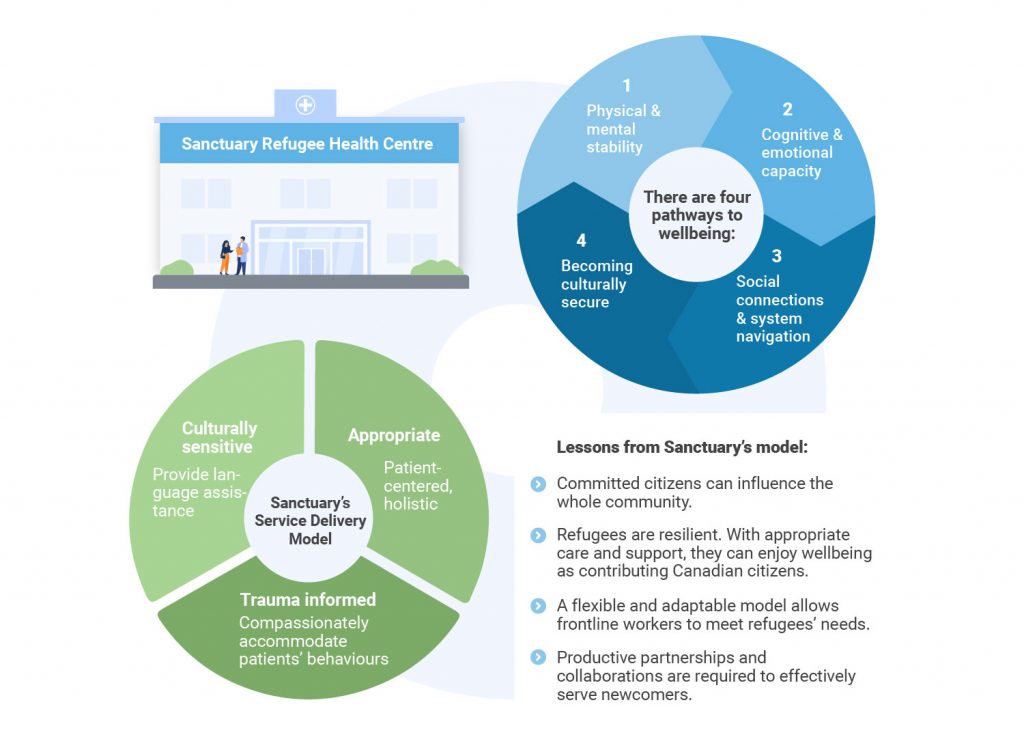Promoting Emotional Well-Being in Refugee Newcomer Families in the Waterloo Region
Researchers: Michael Stephenson1,3, Mark Ferro2, Katholiki Georgiades3, Jenny Jenkins4, Sheri Madigan5, Lehana Thabane 3, Dillon Browne2, Jean de Dieu Basabose2, Jackson Smith2, Nusrat Khan2
Affiliations: Sanctuary Refugee Health Centre1, University of Waterloo2, McMaster University3, University of Toronto4, University of Calgary5
Research Partner: Sanctuary Refugee Health Centre
Keywords: refugees, newcomers, youth and families, emotional wellbeing, Waterloo Region, whole family approach, settlement services, resettlement, mentorship, midsize urban area, Canada
Jump to: Full Infographic, Methodology, Findings, Publications & Reports
Summary
Objective: This study aimed to address gaps in research by deepening our understanding of whole family relationships and child development in the context of Canadian resettlement. The research is expected to inform Canadian immigration and refugee policy, as the Waterloo Region of Ontario reflects commonly overlooked “midsize urban areas” for resettlement.
Justification: More newcomers are settling in midsize urban areas, such as the Waterloo Region, yet these areas are often overlooked in the research on newcomer resettlement. To effectively support the wellbeing of refugees, it is critical for healthcare service providers and practice briefings to adhere to principles of trauma-informed, linguistically tailored, and culturally sensitive healthcare.
Practical goal: To better understand the correlates of emotional wellbeing for children and parents in newcomer families, to improve systematic tracking of emotional outcomes for children and families in the context of community services, and to mobilize general knowledge from the Waterloo Region to the provincial and federal level.
Primary audience: Academics, service providers, policy makers, and the public.
Infographic Excerpt

Methodology
This study began with a need and resource assessment of Sanctuary Health Centre in order to better understand how the community partner organization functions and the challenges it has faced in terms of providing refugee health services and promoting the well-being of refugee families in Waterloo Region. Findings from the study have been analyzed and disseminated to key partners. A final phase of the study is ongoing. In this phase families will be randomly assigned to a (1) mentorship condition or (2) an online, culturally-sensitive, parenting support program provided by an existing partnership with Triple P Canada.
Findings
Some of the learnings so far generated from this study include:
- The commitment of local actors is a key to building a more refugee-friendly and welcoming community. Committed citizens can influence the entire community and inspire policy change in the refugee settlement and integration sector.
- Sanctuary’s Pathway model is appropriate for working with refugees. The model allows for flexibility and the adaptation of interventions, thereby enabling front line staff to effectively meet the patients’ needs.
- Effectively serving refugee newcomers and holistically promoting refugee health requires productive partnerships and collaborations. Sanctuary’s strength mainly lies in working with and involving multiple stakeholders at different levels.
- Applying a holistic approach to addressing mental health concerns for refugees is effective. With a vision to become a hub for refugee health and well-being services, Sanctuary has made efforts to protectively offer a comprehensive “wrap around” care to refugee newcomers and, therefore, has contributed to addressing protective factors that can protect against mental health concerns for refugees.
Recommendations:
- The involvement of individuals from the refugee population in refugee-serving initiatives could contribute to maximizing their impact.
- Establishing caring and trusting relationships between providers and refugee clients is a key to success. When working with the refugee population, it is important to account for factors that contribute to creating a safe and respectful environment for clients and ensuring trusting rapport between service providers and clients.
- The well-being of employees and volunteers who work with refugee populations also matters. Given the complexity of refugee problems and traumatic experiences that they share with their trusted service providers, every refugee-serving organization should develop and implement a plan to prevent staff and volunteer burnout.
Publications & Reports
Explore more projects


